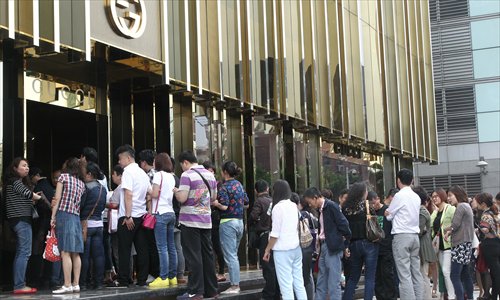Top luxury firms struggling in China
Consumers more price-sensitive, eyeing new brands: analysts

Customers line up in front of Gucci shops in Shanghai in May 2015. Gucci stores in many Chinese cities cut their prices by 50 percent during a sales promotion in May. Photo: IC

Established luxury brands are facing a sales slowdown in China, with consumers shifting toward a more price-sensitive attitude that benefits new emerging luxury brands as well as cross-border e-commerce and overseas purchases, analysts said on Sunday.
Top luxury brand Prada SpA unveiled its first-half financial results on Friday, reporting net revenue of 1.82 billion euros ($2 billion), which missed Bloomberg analysts' estimates of 1.87 billion euros. The company said its business in the Asia-Pacific region showed a negative trend.
"Hong Kong and Macao remain the main drivers affecting the performance in this geographical area [the Asia-Pacific market]," the Milan-based luxury goods maker said in a press release.
Prada said that the overall Asia-Pacific region, a significant market for the company, also recorded a "similar negative trend" in the first quarter of the year, when sales in the Chinese mainland, Hong Kong and Macao fell 19 percent, excluding currency effects.
"Traditional luxury brands in the Chinese market can no longer get back to their golden age of 2011. One-digit growth or even negative performance will become common for them in the market," Zhou Ting, a luxury industry expert with Shanghai-based Fortune Character Institute, told the Global Times on Sunday.
International luxury goods maker LVMH on July 28 also posted its financial report for the first half of the year. CFO Jean-Jacques Guiony said in a conference call that the company's sales in other markets such as Japan and the EU are benefiting from a shift in business from the Chinese mainland, Macao and Hong Kong, where sales slumped about 10 percent year-on-year.
"The EU has become an increasingly attractive luxury shopping destination for tourists from China, as it offers a greater variety of products that are also cheaper than those in the Chinese market," said Zhou, noting that Chinese demand for luxury products is still robust.
The current weakness of the euro is another factor boosting the appeal of buying from the EU, Zhou said.
Tourism spending is a big driver for the luxury goods market, and Chinese consumers, who currently account for over 30 percent of global luxury spending, now conduct 50 percent of their overall luxury spending while they are traveling, according to a report issued by US-based market consultancy Bain & Company in May.
The number of mainland tourists to Hong Kong in the first half of the year fell more than 50 percent year-on-year, while several European countries such as France, Italy, and Germany saw an 80 percent rise in the number of Chinese visitors in the first half from a year earlier, China National Radio reported late in July.
Hong Kong and Macao have already lost their price advantage over the mainland market, after major luxury brands cut mainland prices earlier this year, Yang Qingshan, executive president of the China Brand Strategy Association, told the Global Times on Sunday.
In March, French fashion house Chanel announced price cuts of up to 20 percent for some of its handbags in the mainland. Following this, LVMH also reportedly implemented an 18 percent price reduction in the market.
Both Yang and Zhou said that Chinese consumers are no longer blindly snapping up goods from big-name luxury brands.
"Given the central government's anti-corruption and anti-extravagance campaign, more and more Chinese people have stopped buying expensive luxuries as gifts, and are buying them for their own use," said Yang. "This makes them think more about prices and value, especially amid the economic slowdown."
The analysts' opinion was echoed by a survey of 1,400 Chinese consumers by Bain & Company in January, which found that nearly 45 percent of respondents planned to try emerging luxury brands.
Yang noted that price-sensitive Chinese consumers are also more eager to shop via cross-border e-commerce, as well as using daigou agents, overseas personal shoppers who buy the goods and then send them to consumers in the Chinese mainland.
In 2014, 70 percent of luxury goods bought by mainland consumers were purchased either during overseas travel or through daigou agents, according to Bain's January report.
Against this backdrop, traditional luxury brands are adopting new development strategies, such as putting more efforts into e-commerce, diversifying their product ranges and cutting costs, said Zhou.